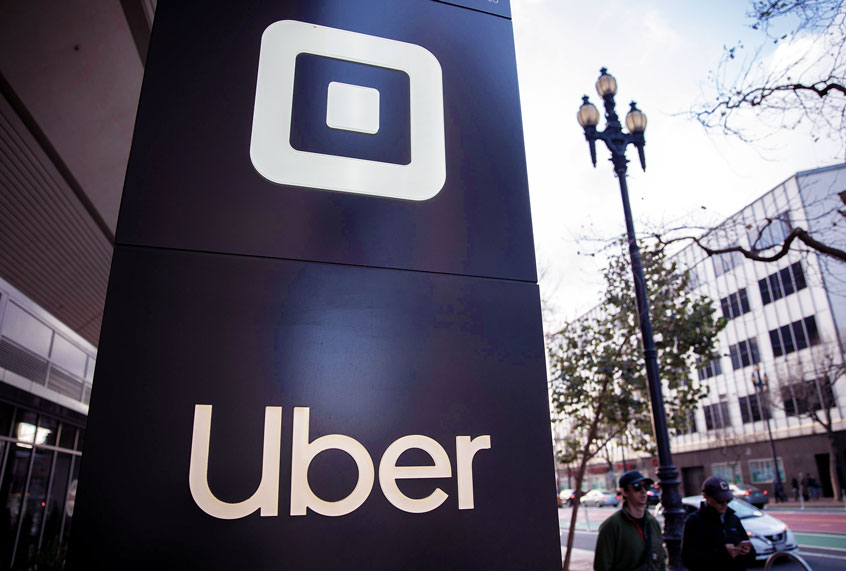
Rideshare behemoth Uber "flouted laws, duped police, exploited violence against drivers and secretly lobbied governments during its aggressive global expansion" according to an explosive report in The Guardian on Sunday.
A trove of more than 124,000 documents and internal communications that were leaked to the publication tells the tale of a years-long pattern of "ethically questionable practices" and outright criminal behavior by the company's top executives. And this is only the beginning.
The paper "led a global investigation into the leaked Uber files, sharing the data with media organisations around the world via the International Consortium of Investigative Journalists (ICIJ). More than 180 journalists at 40 media outlets including Le Monde, Washington Post and the BBC will in the coming days publish a series of investigative reports about the tech giant," it explained.
"The leak spans a five-year period when Uber was run by its co-founder Travis Kalanick, who tried to force the cab-hailing service into cities around the world, even if that meant breaching laws and taxi regulations," The Guardian wrote in its introduction. "During the fierce global backlash, the data shows how Uber tried to shore up support by discreetly courting prime ministers, presidents, billionaires, oligarchs and media barons."
At its heart, the leak indicates that "Uber was adept at finding unofficial routes to power, applying influence through friends or intermediaries, or seeking out encounters with politicians at which aides and officials were not present," and "it enlisted the backing of powerful figures in places such as Russia, Italy and Germany by offering them prized financial stakes in the startup and turning them into 'strategic investors.'"
Uber's chieftains, the exposé uncovered, "were at the same time under no illusions about the company's law-breaking, with one executive joking they had become "pirates" and another conceding: 'We're just fucking illegal,'" the outlet found. "The cache of files, which span 2013 to 2017, includes more than 83,000 emails, iMessages and WhatsApp messages, including often frank and unvarnished communications between Kalanick and his top team of executives."
Among the more jarring revelations were the cozy and duplicitous relationships that Uber had with world leaders, including French President Emmanuel Macron "who secretly helped the company in France when he was economy minister, allowing Uber frequent and direct access to him and his staff;" German Chancellor Olaf Scholz who "pushed back against Uber lobbyists and insisted on paying drivers a minimum wage" and whom Uber mocked as "a real comedian;" and then-Vice President Joe Biden, whom Kalanick reprimanded for being late to a meeting at the World Economic Forum.
"Kalanick texted a colleague: 'I've had my people let him know that every minute late he is, is one less minute he will have with me,'" noted The Guardian. "After meeting Kalanick, Biden appears to have amended his prepared speech at Davos to refer to a CEO whose company would give millions of workers 'freedom to work as many hours as they wish, manage their own lives as they wish.'"
But that was a smokescreen.
"When faced with opposition, Uber sought to turn it to its advantage, seizing upon it to fuel the narrative its technology was disrupting antiquated transport systems, and urging governments to reform their laws," reported The Guardian. 'As Uber launched across India, Kalanick's top executive in Asia urged managers to focus on driving growth, even when 'fires start to burn.' 'Know this is a normal part of Uber's business,' he said. 'Embrace the chaos. It means you're doing something meaningful.'"
That approach came to a head when Uber encouraged its drivers to participate in taxi strikes, such as those that erupted in Paris, France, in 2016.
Yet the company's top brass expressed total disregard for the welfare of its contractors.
The Guardian learned that they were "warned that doing so risked putting Uber drivers at risk of attacks from 'extreme right thugs' who had infiltrated the taxi protests and were 'spoiling for a fight,' Kalanick appeared to urge his team to press ahead regardless. 'I think it's worth it,' he said. 'Violence guarantee[s] success. And these guys must be resisted, no? Agreed that right place and time must be thought out.'"
Kalanick's spokesperson denied the account.
The cab rebellions also brought to light that Uber's ringmasters were keenly aware of and even boastful about their lack of legal status to operate in certain large markets.
"In internal emails, staff referred to Uber's 'other than legal status,' or other forms of active non-compliance with regulations, in countries including Turkey, South Africa, Spain, the Czech Republic, Sweden, France, Germany, and Russia," the investigation discovered.
"One senior executive wrote in an email: 'We are not legal in many countries, we should avoid making antagonistic statements.' Commenting on the tactics the company was prepared to deploy to 'avoid enforcement,' another executive wrote: 'We have officially become pirates,'" The Guardian continued. "Nairi Hourdajian, Uber's head of global communications, put it even more bluntly in a message to a colleague in 2014, amid efforts to shut the company down in Thailand and India: 'Sometimes we have problems because, well, we're just fucking illegal.' Contacted by The Guardian, Hourdajian declined to comment."
Uber did, however, attempt to justify its reasoning by citing outdated laws relating to smartphone technologies.
Skirting law enforcement was yet another tactic that Uber employed to evade accountability.
"Uber developed sophisticated methods to thwart law enforcement. One was known internally at Uber as a 'kill switch.' When an Uber office was raided, executives at the company frantically sent out instructions to IT staff to cut off access to the company's main data systems, preventing authorities from gathering evidence," The Guardian wrote. "The leaked files suggest the technique, signed off by Uber's lawyers, was deployed at least 12 times during raids in France, the Netherlands, Belgium, India, Hungary and Romania."
Here again, Kalanick's spokesperson issued a denial, saying that the "kill switch" was never meant to thwart law enforcement or "legitimate regulatory action."







